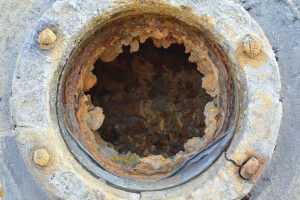Australian scientists turn water treatment sludge into sustainable concrete

Cracked and corroded sewer pipes cost Australian taxpayers nearly €40 billion each year (Photo: University of South Australia)
June 5, 2025 – Researchers at the University of South Australia (UniSA) have developed a corrosion-resistant material for traditional cement sewer pipes, which are prone to cracking and corrosion. The method is based on a combination of sludge – a by-product of drinking water purification – and blast furnace slag. The UniSA team demonstrated that this new, corrosion-resistant material is more than 50 percent stronger than traditional cement and resistant to acid-induced degradation.
Concrete is widely used in Australia for sewer pipe production due to its availability, affordability, and structural strength. However, it is vulnerable to acid and microbial corrosion in sewer systems, leading to frequent repairs and maintenance that cost Australian taxpayers nearly €40 billion annually.
The research was published in the Journal of Building Engineering under the title:
‘Evaluating microbiologically influenced corrosion in alkali-activated materials incorporating alum sludge.’









